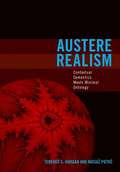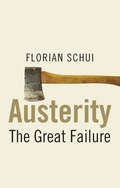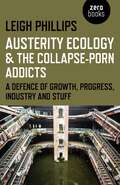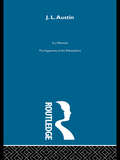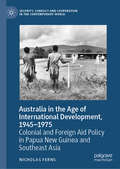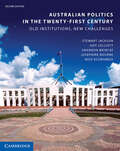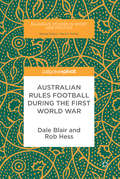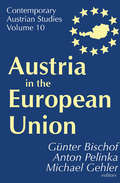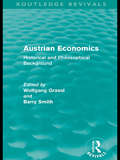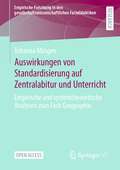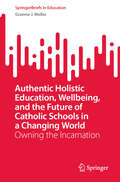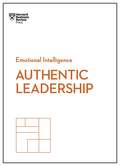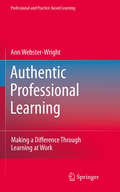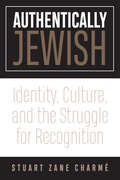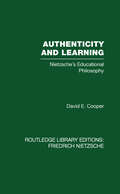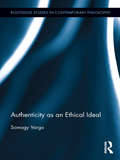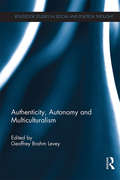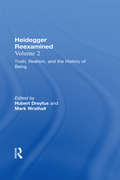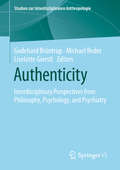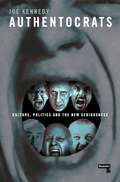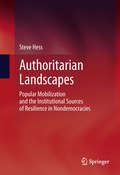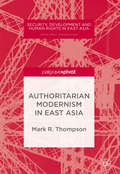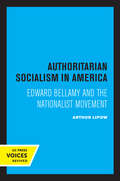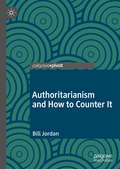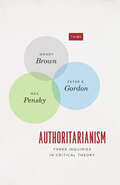- Table View
- List View
Austere Realism: Contextual Semantics Meets Minimal Ontology
by Matjaz Potrc Terry HorganThe authors of Austere Realism describe and defend a provocative ontological-cum-semantic position, asserting that the right ontology is minimal or austere, in that it excludes numerous commonsense posits, and that statements employing such posits are rational.
Austerity
by Florian SchuiAusterity is at the center of political debates today. Its defenders praise it as a panacea that will prepare the ground for future growth and stability. Critics insist it will precipitate a vicious cycle of economic decline, possibly leading to political collapse. But the notion that abstinence from consumption brings benefits to states, societies, or individuals is hardly new. This book puts the debates of our own day in perspective by exploring the long history of austerity-a popular idea that lives on despite a track record of dismal failure. Florian Schui shows that arguments in favor of austerity were-and are today-mainly based on moral and political considerations, rather than on economic analysis. Unexpectedly, it is the critics of austerity who have framed their arguments in the language of economics. Schui finds that austerity has failed intellectually and in economic terms every time it has been attempted. He examines thinkers who have influenced our ideas about abstinence from Aristotle through such modern economic thinkers as Smith, Marx, Veblen, Weber, Hayek, and Keynes, as well as the motives behind specific twentieth-century austerity efforts. The persistence of the concept cannot be explained from an economic perspective, Schui concludes, but only from the persuasive appeal of the moral and political ideas linked to it.
Austerity Ecology & the Collapse-Porn Addicts: A Defence Of Growth, Progress, Industry And Stuff
by Leigh PhillipsEconomic growth, progress, industry and, erm, stuff have all come in for a sharp kicking from the green left and beyond in recent years. Everyone from black-hoodied Starbucks window-smashers to farmers' market heirloom-tomato-mongers to Prince Charles himself seem to be embracing 'degrowth' and anti-consumerism, which is nothing less than a form of ecological austerity. Meanwhile, the back-to-the-land ideology and aesthetic of locally-woven organic carrot-pants, pathogen-encrusted compost toilets and civilisational collapse is hegemonic. Yet modernity is not the cause of climate change and the wider biocrisis. It is indeed capitalism that is the source of our environmental woes, but capitalism as a mode of production, not the fuzzy understanding of capitalism of Naomi Klein, Bill McKibben, Derrick Jensen, Paul Kingsnorth and their anarcho-liberal epigones as a sort of globalist corporate malfeasance. In combative and puckish style, science journalist Leigh Phillips marshals evidence from climate science, ecology, paleoanthropology, agronomy, microbiology, psychology, history, the philosophy of mathematics, and heterodox economics to argue that progressives must rediscover their historic, Promethean ambitions and counter this reactionary neo-Malthusian ideology that not only retards human flourishing, but won't save the planet anyway. We want to take over the machine and run it rationally, not turn the machine off.
Austin-Arg Philosophers (Arguments Of The Philosophers Ser.)
by G.J. WarnockThis book is available either individually, or as part of the specially-priced Arguments of the Philosphers Collection.
Australia in the Age of International Development, 1945–1975: Colonial and Foreign Aid Policy in Papua New Guinea and Southeast Asia (Security, Conflict and Cooperation in the Contemporary World)
by Nicholas FernsThis book examines Australian colonial and foreign aid policy towards Papua New Guinea and Southeast Asia in the age of international development (1945–1975). During this period, the academic and political understandings of development consolidated and informed Australian attempts to provide economic assistance to the poorer regions to its north. Development was central to the Australian colonial administration of PNG, as well as its Colombo Plan aid in Asia. In addition to examining Australia’s perception of international development, this book also demonstrates how these debates and policies informed Australia’s understanding of its own development. This manifested itself most clearly in Australia’s behavior at the 1964 United Nations Conference on Trade and Development (UNCTAD). The book concludes with a discussion of development and Australian foreign aid in the decade leading up to Papua New Guinea’s independence, achieved in 1975.
Australian Politics in the Twenty-First Century: Old Institutions, New Challenges
by Nick Economou Shannon Brincat Stewart Jackson Joff Lelliott Josephine Bourne<p>The global political environment in the twenty-first century is proving dynamic and challenging for Australian policymakers and political institutions. Australian Politics in the Twenty-first Century contextualises the Australian political landscape through an institutional lens. It examines the legislative and judicial bodies, minor parties, lobby groups, the media and the citizenry, providing historical and contemporary facts, explaining political issues and examining new challenges. The second edition has been updated to reflect the application of political theories in today's civic environment. New spotlight boxes highlight issues including marriage equality, COVID-19 and federalism, the inclusion of First Nations peoples in the political system, and gender equality in public policy. Short-answer, reflection, research and discussion questions encourage students to test and extend their knowledge of each topic and to clearly link theory to practice. Written in an accessible and engaging style, Australian Politics in the Twenty-First Century is an invaluable introduction to the Australian political system.</p>
Australian Rules Football During the First World War
by Dale Blair Rob HessThe book explores the intersection between the Great War and patriotism through an examination of the effects of both on Australia’s most popular football code. The work is chronological, and therefore provides an easy path by which events may be followed. Ultimately it seeks to shine a light on and provide considerable detail to a much-ignored period in Australian Rules football history, including women’s football history, that was subject to much upheaval and which reflected considerable social and class divisions in society at the time. One hundred years on, the Australian Football League presents past soldier footballers as unequivocal representatives of a unifying national ‘Anzac’ spirit. That is far from the reality of football’s First World War experience.
Austria in the European Union (Contemporary Austrian Studies #Vol. 10)
by Günter Bischof, Anton Pelinka, and Michael GehlerAustria joined the European Union in 1995, with the overwhelming support of its citizenry. In June 1994, a record 66.6 percent of the Austrian population voted in favor of joining the Union, and Austria acceded on January 1, 1995. Only three years later, in the second half of 1998, Austria assumed its first presidency of the European Union. Its competent conduct of the Union's business enhanced its reputation. The sense that Austria was a role model collapsed overnight, after a new conservative People's Party (iVP/FPi) coalition government was formed in Austria in early February 2000. Austria became Europe's nightmare.This volume has two purposes. The first is to assess Austria's first five years in the European Union. The second is Austria's ongoing struggle with its past. Heinrich Neisser evaluates and assesses Austria's commitment to the European Union. Thomas Angerer offers a long-term perspective of regionalization and globalization trends in Austrian foreign affairs. Waldemar Hummer analyzes contradictions between Austrian neutrality and Europe's emerging common security policy. Johannes Pollak and Sonja Puntscher Rieckmann look at current debates over weighing future voting rights in the European Commission. Michael Huelshoff evaluates Austria's EU presidency in 1998 and compares it to the subsequent 1999 German presidency. Gerda Falkner examines the withering away of the previously much admired Austrian welfare state. Walter Manoschek scrutinizes the Nazi roots of Jorg Haider's Freedom Party. Michael Gehler critiques the EU sanctions and bemoans the absence of mediation through transnational Christian conservative parties.In reviewing how Austria deals with World War II, Richard Mitten investigates discourses on victimhood in postwar Austria and the place of Jews in this process. A "Roundtable" presents overwhelming evidence of Austrians' deep involvement in Nazi war crimes, and includes articles by Sabine Loitfellner and Winfried Garscha. This addition to the Contemporary Austrian Studies series will be welcomed by political scientists, historians and legal scholars, particularly those with a strong interest in European affairs.
Austrian Economics: Historical and Philosophical Background (Routledge Revivals)
by Wolfgang GrasslFirst published in 1986, this book presents a reissue of the first detailed confrontation between the Austrian school of economics and Austrian philosophy, especially the philosophy of the Brentano school. It contains a study of the roots of Austrian economics in the liberal political theory of the nineteenth-century Hapsburg empire, and a study of the relations between the general theory of value underlying Austrian economics and the new economic approach to human behaviour propounded by Gary Becker and others in Chicago. In addition, it considers the connections between Austrian methodology and contemporary debates in the philosophy of the social sciences.
Auswirkungen von Standardisierung auf Zentralabitur und Unterricht: Empirische und systemtheoretische Analysen zum Fach Geographie (Empirische Forschung in den gesellschaftswissenschaftlichen Fachdidaktiken)
by Johanna MäsgenIn diesem Open-Access-Buch werden mithilfe der forschungsleitenden Frage: „Wie ist Geographieunterricht angesichts des Zentralabiturs möglich?“ die Auswirkungen der Einrichtung beziehungsweise funktionalen Umdeutung des Zentralabiturs in den Bundesländern untersucht und systemtheoretisch interpretiert. In einer quantitativen Studie wird gezeigt, dass die Standardisierungsbemühungen der Bildungspolitik durch die Umsetzung in der Schulorganisation zu standardisierten Zentralabiturprüfungsaufgaben auf der Ebene der Bundesländer führen. In einer qualitativen Interviewstudie werden die Möglichkeiten von Geographielehrer_innen nachvollzogen, angesichts des Zentralabiturs zu handeln. Die Ergebnisse beleuchten das Zusammenspiel von Zentralabitur, Unterricht und unterrichtlichen Klausuren und die Rolle von Akteur_innen. Die individuellen Handlungsphänomene divergieren, dennoch können Typen identifiziert werden, die sich hinsichtlich der Intensität und der Frequenz der schulischen Gestaltung unterscheiden. Die systemtheoretische Interpretation der empirischen Ergebnisse kommt zu dem Ergebnis, dass der Unterricht – und damit das Erziehungssystem als Ganzes – durch Selbst- und Fremdbeschränkung sowie durch Konkurrenz von Vermittlung/Aneignung und Selektion gefährdet ist.
Authentic Holistic Education, Wellbeing, and the Future of Catholic Schools in a Changing World: Owning the Incarnation (SpringerBriefs in Education)
by Graeme J. MellorThis book addresses the effects of the changed and changing contexts of Catholic Education in the contemporary world. These include the social, educational, and ecclesial contexts. Meaning structures, shaped by these past contexts, have broken down, and the greatest, but often unarticulated context is the anthropological context. The understanding of humanity and the meaning of human existence today is beset by a marked lack of clarity and consistent direction. Catholic Education today exists within contextual fields which are almost unrecognizable from those which existed at the close of the Second World War. Each succeeding decade since has wrought stark and dynamic change socially, educationally, and religiously. As such, Catholic Education today looks for a direction forward and a sense of purpose into the future. This book proposes that the major purpose of contemporary Catholic Education is to provide an educational context that nurtures the true holistic growth of students within its care. The focus upon Christian Humanism in contemporary Papal and Magisterial teaching sets the ground for this developing understanding.
Authentic Leadership (HBR Emotional Intelligence Series)
by Harvard Business Review PressThis collection of articles includes: "Discovering Your Authentic Leadership" by Bill George, Peter Sims, Andrew N. McLean, and Diana Mayer; "The Authenticity Paradox" by Herminia Ibarra; "What Bosses Gain by Being Vulnerable" by Emma Seppala; "Practice Tough Empathy" by Rob Goffee and Gareth Jones; "Cracking the Code That Stalls People of Color" by Sylvia Ann Hewitt; "For a Corporate Apology to Work, the CEO Should Look Sad" by Sarah Green Carmichael; and "Are Leaders Getting Too Emotional?" an interview with Gautam Mukunda and Gianpiero Petriglieri by Adi Ignatius and Sarah Green Carmichael. <p><p> How to be human at work. The HBR Emotional Intelligence Series features smart, essential reading on the human side of professional life from the pages of Harvard Business Review. Each book in the series offers proven research showing how our emotions impact our work lives, practical advice for managing difficult people and situations, and inspiring essays on what it means to tend to our emotional well-being at work. Uplifting and practical, these books describe the social skills that are critical for ambitious professionals to master.
Authentic Professional Learning: Making a Difference Through Learning at Work (Professional and Practice-based Learning #2)
by Ann Webster-WrightThis book describes the experiences of professionals as they continue to learn at work. Although its focus is on the learning of health professionals, it draws on research about continuing learning from other "caring" professions such as education and social services. The author argues for a significant paradigm shift in this book, from the usual practice of providing programs to develop professionals, towards a better way of supporting professionals as they learn in their own authentic ways. The construct of "Authentic Professional Learning" developed in this book describes the lived experience of professionals continuing to learn in practice, whilst dealing with contemporary workplace dilemmas. Many of these dilemmas revolve around the need for professionals to demonstrate measurable efficacy and fiscal efficiency whilst wanting to make a difference to the lives of those they care for. Using vignettes of practice, professionals from community-based education and health settings describe authentic ways of being, practising and learning as professionals; drawing meaning from their work whilst accepting their professional responsibilities. Commonalities across diverse experiences of learning are described in terms of four inter-linked constituents (understanding, engagement, interconnection and openness) within a phenomenological conceptual framework that focuses on the meaning of experiences for those professionals.
Authentically Jewish: Identity, Culture, and the Struggle for Recognition
by Stuart Z. CharméThis book analyzes the different conceptions of authenticity that are behind conflicts over who and what should be recognized as authentically Jewish. Although the concept of authenticity has been around for several centuries, it became a central focus for Jews since existentialist Jean-Paul Sartre raised the question in the 1940s. Building on the work of Sartre, later Jewish thinkers, philosophers, anthropologists, and cultural theorists, the book offers a model of Jewish authenticity that seeks to balance history and tradition, creative freedom and innovation, and the importance of recognition among different groups within an increasingly multicultural Jewish community. Author Stuart Z. Charmé explores how debates over authenticity and struggles for recognition are a key to understanding a wide range of controversies between Orthodox and liberal Jews, Zionist and diaspora Jews, white Jews and Jews of color, as well as the status of intermarried and messianic Jews, and the impact of Jewish genetics. In addition, it discusses how and when various cultural practices and traditions such as klezmer music, Israeli folk dance, Jewish yoga and meditation, and others are recognized as authentically Jewish, or not.
Authenticity and Learning: Nietzsche's Educational Philosophy (Rouledge Library Editions: Friedrich Nietzsche)
by David CooperDavid E. Cooper elucidates Nietzsche's educational views in detail, in a form that will be of value to educationalists as well as philosophers. In this title, first published in 1983, he shows how these views relate to the rest of Nietzsche's work, and to modern European and Anglo-Saxon philosophical concerns. For Nietzsche, the purpose of true education was to produce creative individuals who take responsibility for their lives, beliefs and values. His ideal was human authenticity. David E. Cooper sets Nietzsche's critique against the background of nineteenth-century German culture, yet is concerned at the same time to emphasize its bearing upon recent educational thought and policy.
Authenticity as an Ethical Ideal (Routledge Studies in Contemporary Philosophy)
by Somogy VargaAuthenticity has become a widespread ethical ideal that represents a way of dealing with normative gaps in contemporary life. This ideal suggests that one should be true to oneself and lead a life expressive of what one takes oneself to be. However, many contemporary thinkers have pointed out that the ideal of authenticity has increasingly turned into a kind of aestheticism and egoistic self-indulgence. In his book, Varga systematically constructs a critical concept of authenticity that takes into account the reciprocal shaping of capitalism and the ideal of authenticity. Drawing on different traditions in critical social theory, moral philosophy and phenomenology, Varga builds a concept of authenticity that can make intelligible various problematic and potentially exhausting practices of the self.
Authenticity, Autonomy and Multiculturalism (Routledge Studies in Social and Political Thought)
by Geoffrey Brahm LeveyThe concept of "authenticity" enters multicultural politics in three distinct but interrelated senses: as an ideal of individual and group identity that commands recognition by others; as a condition of individuals’ autonomy that bestows legitimacy on their values, beliefs and preferences as being their own; and as a form of cultural pedigree that bestows legitimacy on particular beliefs and practices (commonly called "cultural authenticity"). In each case, the authenticity idea is called on to anchor or legitimate claims to some kind of public recognition. The considerable work asked of this concept raises a number of vital questions: Should "authenticity" be accorded the importance it holds in multicultural politics? Do its pitfalls outweigh its utility? Is the notion of "authenticity" avoidable in making sense of and evaluating cultural claims? Or does it, perhaps, need to be rethought or recalibrated? Geoffrey Brahm Levey and his distinguished group of philosophers, political theorists, and anthropologists challenge conventional assumptions about "authenticity" that inform liberal responses to minority cultural claims in Western democracies today. Discussing a wide range of cases drawn from Britain and continental Europe, North America, Australia and the Middle East, they press beyond theories to consider also the practical and policy implications at stake. A helpful resource to scholars worldwide in Political and Social Theory, Political Philosophy, Legal Anthropology, Multiculturalism, and, more generally, of cultural identity and diversity in liberal democracies today.
Authenticity, Death, and the History of Being: Heidegger Reexamined
by Hubert Dreyfus Mark WrathallFirst Published in 2003. Heidegger and the study of his thought have earned wide acceptance, extending beyond philosophy to influence an array of other disciplines. Critically selected by leading scholars in the field, the articles in this new collection bring together the most essential and representative scholarship on Heidegger. Focusing on the major phases of his work which attracted most attention from contemporary thinkers, as well as exploring new and important areas of Heidegger scholarship, this four-volume set is an invaluable resource for any curriculum supporting philosophy, as well as political theory, literature, classics, anthropology, and cultural studies.
Authenticity: Interdisciplinary Perspectives from Philosophy, Psychology, and Psychiatry (Studien zur Interdisziplinären Anthropologie)
by Michael Reder Godehard Brüntrup Liselotte GierstlToday, authenticity is considered an essential part of manifold interpersonal relationships, actions, and agreements. Authenticity’s association with sincerity, honesty, and reliability not only normatively charges the term in the context of social coexistence, but also makes it a demand which we impose on ourselves: The success of our lives is measured decisively by whether we live in harmony with our own convictions, wishes and needs. In philosophy, authenticity has also become the focus of interest, both in the context of the mechanisms of self-knowledge, as well as of personal development.The anthology aims to expand the cooperation across disciplines, in order to develop a comprehensive and profound understanding of authenticity, not by over-simplifying the highly complex subject, but by approaching the underlying concept from different scientific perspectives.
Authentocrats: Culture, Politics and the New Seriousness
by Joe Kennedy"The Authentocrats" claim to the be the new voice of common sense that speak for the common man and woman; right-wing, traditional and dangerous, Joe Kennedy argues that they are everything but what they purport to be.In contemporary Britain, a lot has been said about what it is that “real people” want politically. Forgotten by elites and sick of globalisation, so the story goes, they demand patriotism, respect for the military, assurances on defence, and controls on immigration. In trying to meet these supposed wishes, politicians attempt to appear normal, salt-of-the-earth, authentic. Authentocrats examines the function of this “authenticity” in a centrist politics which, paradoxically, often defines itself as cosmopolitan, technocratic and opposed to populism. Casting a doubtful eye over – amongst other things – latter-day James Bond films, contemporary nature writing and stand-up comedy, Authentocrats suggests that the sooner we can break with the sententiousness of a skewed conception of authenticity in aesthetics and politics the better.
Authoritarian Landscapes: Popular Mobilization and the Institutional Sources of Resilience in Nondemocracies
by Steve HessThe turbulent year of 2011 has brought the appearance of mass popular unrest and the collapse of long lived autocratic regimes in Egypt, Tunisia, Libya and possibly Syria. The sudden and unanticipated fall of these regimes - often thought of as exemplars of authoritarian resilience - has brought much of the conventional wisdom on the durability and vulnerability of nondemocratic regimes into question. This book seeks to advance the existing literature by treating the autocratic state not as a unitary actor characterized by strength or weakness but rather as a structure or terrain that can alternatively inhibit or facilitate the appearance of national level forms of protests. In the mode of the Arab Spring, the color revolutions of the former Soviet Union, and the people power movement of the Philippines, such movements overcome the daunting impediments presented by autocrats, appeal to likeminded counterparts across society, and overwhelm the ability of regimes to maintain order. Conversely, in other settings, such as contemporary China, decentralized state structures provide an inhospitable environment for national-level protest, leading collective actors to opt for more local and parochial forms of contention. This outcome produces paradoxical situations, such as in the PRC, where protests are frequent but national-level mobilization and coordination is absent.
Authoritarian Modernism in East Asia (Security, Development and Human Rights in East Asia)
by Mark R. ThompsonFollowing Barrington Moore Jr., this book raises doubts about modernization theory’s claim that an advanced economy with extensive social differentiation is incompatible with authoritarian rule. Authoritarian modernism in East Asia (Northeast and Southeast Asia) has been characterized by economically reformist but politically conservative leaders who have attempted to learn the “secrets” of authoritarian rule in modern society. They demobilize civil society while endeavoring to establish an “ethical” form of rule and claim reactionary culturalist legitimation. With China, East Asia is home to the most important country in the world today that is rapidly modernizing while attempting to remain authoritarian.
Authoritarian Socialism in America: Edward Bellamy and the Nationalist Movement
by Arthur LipowIn Authoritarian Socialism Arthur Lipow raises important issues about the nature of democracy and defines the intellectual roots of the authoritarian side of the socialist tradition in America and distinguishes it from democratic socialism. This title is part of UC Press's Voices Revived program, which commemorates University of California Press’s mission to seek out and cultivate the brightest minds and give them voice, reach, and impact. Drawing on a backlist dating to 1893, Voices Revived makes high-quality, peer-reviewed scholarship accessible once again using print-on-demand technology. This title was originally published in 1982.
Authoritarianism and How to Counter It
by Bill JordanAfter the collapse of the Soviet Union, it was assumed that liberal democracies would flourish worldwide. Instead, today authoritarian leaders are gaining power – from Trump’s US and Bolsonaro's Brazil to Orban's Hungary – while Russia and China have turned back towards their old, autocratic traditions. This book examines the origins and implications of this shift, and focusses especially on the longstanding coercion of poor people. As industrial employment, and now also many service jobs, are being replaced through technological innovations, state-subsidised, low-paid, insecure work is being enforced through regimes of benefits cuts and sanctions. Authoritarians are exploiting the divisions in the working class that this creates to stoke resentment against immigrants and poor people. The author identifies new social movements and policies (notably the Universal Basic Income) which could counter these dangers.
Authoritarianism: Three Inquiries in Critical Theory (TRIOS)
by Wendy Brown Peter E. Gordon Max PenskyThree distinguished scholars draw on critical theory to address the causes and circumstances behind the rise of autocracies and oligarchies.Across the Euro-Atlantic world, political leaders have been mobilizing their bases with nativism, racism, xenophobia, and paeans to “traditional values,” in brazen bids for electoral support. How are we to understand this move to the mainstream of political policies and platforms that lurked only on the far fringes through most of the postwar era? Does it herald a new wave of authoritarianism? Is liberal democracy itself in crisis?In this volume, three distinguished scholars draw on critical theory to address our current predicament. Wendy Brown, Peter E. Gordon, and Max Pensky share a conviction that critical theory retains the power to illuminate the forces producing the current political constellation as well as possible paths away from it. Brown explains how “freedom” has become a rallying cry for manifestly un-emancipatory movements; Gordon dismantles the idea that fascism is rooted in the susceptible psychology of individual citizens and reflects instead on the broader cultural and historical circumstances that lend it force; and Pensky brings together the unlikely pair of Tocqueville and Adorno to explore how democracies can buckle under internal pressure.These incisive essays do not seek to smooth over the irrationality of the contemporary world, and they do not offer the false comforts of an easy return to liberal democratic values. Rather, the three authors draw on their deep engagements with nineteenth—and twentieth—century thought to investigate the historical and political contradictions that have brought about this moment, offering fiery and urgent responses to the demands of the day.“A brilliant and urgent assessment of democracy’s current crisis and capitalism’s increasing authoritarianism. . . . a profound diagnosis of this moment’s political ills.” —Astra Taylor, author of Democracy May Not Exist, but We’ll Miss It When It's Gone
